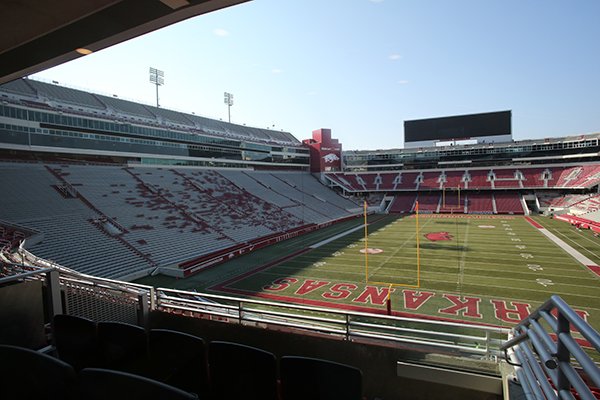FAYETTEVILLE — No one officially declares it such.
Nonetheless, a ceasefire of likely lasting effect pauses college athletics’ facilities arms race.
After decades of athletic directors measuring prowess on how many facilities taj mahals they could build keeping up with the Joneses, all the Joneses now sit beached in the same quarantined by the coronavirus boat.
All those stadiums and arenas they built anew or lavishly luxury box expanded now cavernously gape emptier than a hermit’s wake.
The collegiate spring sports season has been canceled since mid-March. Nobody for now can assure next autumn there will be a 2020 football season, the cash cow for most NCAA Division 1 programs.
Nobody even knows if college campuses will be open for fall classes or remain closed with all classes conducted online, this spring semester’s worldwide mode since mid-March. Already the University of Arkansas’ summer semester schedules strictly online.
Other than maybe tax shelters, building anything appears in indefinite abeyance.
“I think that’s inevitable,” Arkansas Razorbacks Athletic Director Hunter Yurachek said. “I can’t speak for each institution, but I think in the economic climate not only in college athletics but higher education, in general, we will see a slowdown. It hasn’t just been athletic facilities on college campuses. Many college campuses have upgraded their infrastructure with new and shiny buildings to service the needs of their general student body. So I think you will see, whether it comes to a halt, a real significant slowdown.”
It won’t slow entirely at Arkansas.
The already committed projects for the J.B Hunt Baseball Development Center addition to Baum-Walker Stadium and the Bank of America Development project for the Randal Tyson Indoor Track, hosting the 2021 Men’s and Women’s NCAA Indoor Track and Field Championships, and the John McDonnell Outdoor Track continue.
“We have raised the money and bonded the money and it was approved by the Board before covid-19 hit,” Yurachek said. “So those projects are all underway.”
After that hang up the hard hats for awhile.
“The only other commitment that I see close to imminent in my opinion, and that is three or four or five years away, is a renovation of Bud Walton Arena, Yurachek said. “That’s probably our last major facility project. That’s due in the next five years but obviously we have no idea what the economic climate is going to be three to five months from now much less three to five years from now.”
So while pleased with 31,000 pledged season football ticket renewals, Yurachek knows many come late summer when the purchases are scheduled for completion could teeter financially precarious because of the pandemic induced worldwide shutdown.
“Absolutely we have that concern,” Yurachek said. “We have told our fans as we have been renewing season tickets and with the Razorback Foundation that we are working with our fans as much as we can. We have stretched payment plans out for families as much as we can. We are trying to do as much as we can to help them.”

